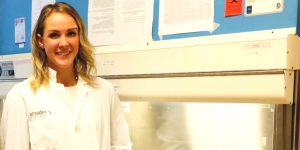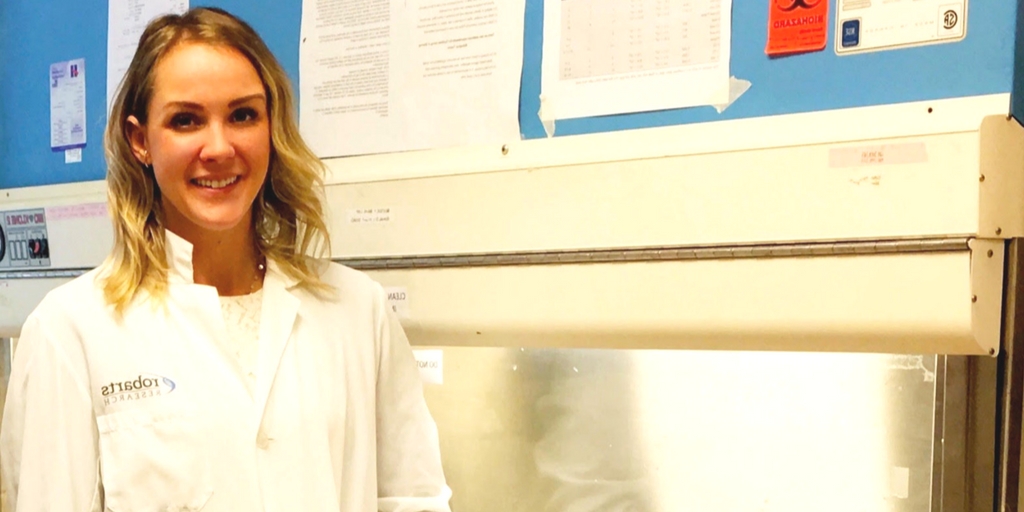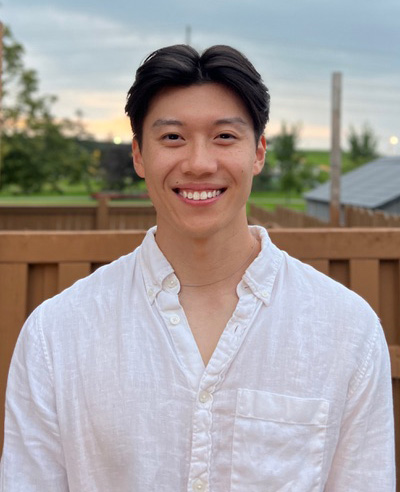“In my research area, it is important to be a hands-on person with advanced critical thinking skills,” says Ashley Makela. She believes such an approach is key to developing innovative ideas.
With hands-on experience working in radiology under her belt, Ashley Makela is in the 4th year of her PhD studies in the Department of Medical Biophysics at Western University at Robarts Research Institute in Dr. Paula Foster’s lab. Her research focuses on developing MRI techniques to track cells, specifically in breast cancer.
After obtaining a BSc degree in Medical Radiation Science at University of Toronto, Ashley worked as a radiological technologist. “I liked doing imaging myself, but I wanted to get into the research aspect of it,” recalls Ashley. “Western has perfect research programs in medical imaging and provides the opportunity to put together both the science and the technology that suits my aspirations perfectly.”
The research Ashley is currently overseeing utilizes MRI cell tracking which may produce novel knowledge about specific cells called tumour-associated macrophages (TAMs). Ashley explains that TAMs are the most common immune cells found within the microenvironment of many solid tumors and their presence and number have prognostic value. “In breast cancer, TAMs correlate with cancer progression and metastatic growth, which means spreading of cancer to other areas of the body. More simply, their presence helps the tumour grow. Clinical data shows that there is a strong correlation between macrophage infiltration and poor prognosis in the majority (80%) of breast cancer cases.”
 What Ashley wants to do is to use the presence and number of these macrophages as a biomarker of breast cancer. She envisions using imaging to track those macrophages in the body. This helps gain more information about the primary tumour and where the cancer cells may have spread. “This information will be of high importance in breast cancer detection, prognosis and treatment evaluation.”
What Ashley wants to do is to use the presence and number of these macrophages as a biomarker of breast cancer. She envisions using imaging to track those macrophages in the body. This helps gain more information about the primary tumour and where the cancer cells may have spread. “This information will be of high importance in breast cancer detection, prognosis and treatment evaluation.”
There is a traditional way to learn more about TAMs in which human tumor tissue is obtained by biopsy and then studied with a microscope. “With histological analysis, we can get a snapshot in time,” says Ashley. “Yet, biopsy takes only the part of the tumour. It is easy to miss other important areas in the tumour. Finally, biopsies are not intended to be used over time, whereas our method can be used longitudinally, which means throughout time, with multiple MRI sessions. We also could track treatment response. And our method would be more comfortable for patients because it is not invasive.”
Recently, Ashley published an article that compared iron- and fluorine-based MRI cell tracking based on an in vivo experiment in mice. Iron and fluorine are the two cell-labeling agents. “Fluorine-19 works better for my purposes because it gives us quantitative data,” Ashley says. “With fluorine-19-based MRI cell tracking, we can evaluate the density and distribution of macrophages within breast cancer tumors and associated metastases. It shows that TAMs could be used as a biomarker and to help understand how to treat breast cancer patients and how they respond to therapy.”
Going further, Ashley is going to take a step from the 9.4 Tesla preclinical scanner towards the 3 Tesla clinical MRI. Many times, dealing with animal models involves the use of preclinical scanners that cannot be used for human patients. Currently, Ashley is working on optimizing clinical scanners to have high image quality and reduced scan time. “Our little mice can be imaged with a human coil on a clinical MRI, which makes translation a reasonable task.”
Pioneering research is challenging but also engaging and thought-provoking, argues Ashley in conclusion. “Our technique is a fairly new one and is still being developed. There are few research groups in the world doing this. If we have any questions, we do have to figure out a lot of things by ourselves!”
Support researchers like Ashley Makela and others by considering a donation to the Breast Cancer Society of Canada. Find out how you can help fund life-saving research, visit bcsc.ca/donate
Ashley Makela’s story was transcribed from interviews conducted by BCSC volunteer Natalia Mukhina – Health journalist, reporter and cancer research advocate
Natalia Mukhina, MA in Health Studies, is a health journalist, reporter and cancer research advocate with a special focus on breast cancer. She is blogging on the up-to-date diagnostic and treatment opportunities, pharmaceutical developments, clinical trials, research methods, and medical advancements in breast cancer. Natalia participated in numerous breast cancer conferences including 18th Patient Advocate Program at 38th San Antonio Breast Cancer Symposium. She is a member of The Association of Health Care Journalists.




